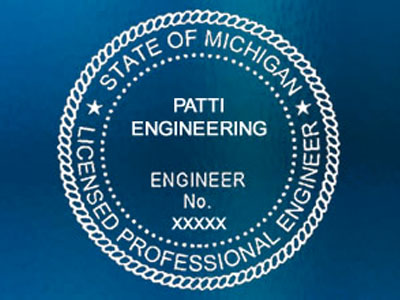
Professional Engineering (PE) Designation & Forensic Engineering
Did you know that Patti Engineering has been called on to serve as an expert witness in cases involving industrial automation? Like any professional service, engineering and control systems integration carries some risk. A minor miscalculation in a line of code can bring down an entire system, causing your client to lose time and money – or worse, cause damages to other system components and/or cause injury.
As an expert witness, Patti Engineering uses our extensive experience and expertise to uncover the primary cause of why a system and/or project has failed in terms of quality, cost, schedule, functionality and performance. Although multiple parties tend to contribute to a failure, courts typically hold one party more responsible than the others, and often the determination of liability can be an obscure task. To help the court correctly attribute the primary blame for the project failure, it is important to carefully isolate and identify the root cause of failure. A Professional Engineer (PE) experienced in Forensic Engineering and experienced with testifying as an expert witness, can be critical to the outcome of a lawsuit.
What is a Professional Engineer (PE)?
A Professional Engineer (PE) is an engineer certified by a state board of registration to practice engineering. A PE must be licensed in each state in which he or she wishes to practice engineering. The PE license is the engineering profession’s highest standard of competence, a symbol of achievement and assurance of quality.
A century ago, anyone could work as an engineer without proof of competency. In order to protect the public health, safety, and welfare, the first engineering licensure law was enacted in 1907 in Wyoming. Now every state regulates the practice of engineering to ensure public safety by granting only Professional Engineers (PE’s) the authority to sign and seal engineering plans and offer their services to the public.
What is a PE ?
- To a client, it means you have the credentials to earn their trust.
- To an employer, it signals your ability to take on a higher level of responsibility.
- To colleagues, it demands respect.
- To yourself, it’s a symbol pride and measure of your own hard-won achievement.
What are the requirements to become a licensed PE?
- Earn a four-year degree in engineering from an ABET accredited university
- Pass the Fundamentals of Engineering (FE) exam
- Complete four years of progressive engineering experience under a PE
- Pass the Principles and Practice of Engineering (PE) exam
- Get 5 references from other professional engineers
- PE’s must improve their skills by fulfilling continuing education requirement
What makes a PE different?
Licensure is the mark of a professional. Ethical standards, continuing education, and professional competency are expected. “PE” after your name indicates you have met the standards and can be respected as a professional. Regulation of the engineering profession was established to protect the safety, well-being and other interests of the general public. A licensed professional engineer has the authority to take legal responsibility for engineering work. Only a PE can sign and seal engineering documents (reports, drawings, and calculations for a study, design or analysis) that are submitted to a public authority or for public and private clients.
A PE is required to do forensic engineering and to be an engineering expert witness. Forensic engineering is the study of failures, accidents, and other incidents involving engineered products which caused personal injury or damage to property. The goal of forensic engineering is to find out what happened when something went wrong, and why it happened.
Engineering expert witnesses are highly credentialed professional engineers that provide litigation support through review, evaluation, inspection, laboratory testing, report writing, depositions and court testimony.
In some states only licensed engineers are permitted to use the title of engineer or to practice engineering professionally.
Professional Engineers Code of Ethics
- Hold paramount the safety, health, and welfare of the public.
- Perform services only in areas of their competence.
- Issue public statements only in an objective and truthful manner.
- Act for each employer or client as faithful agents or trustees. Avoid deceptive acts.
- Conduct themselves honorably, responsibly, ethically, and lawfully



